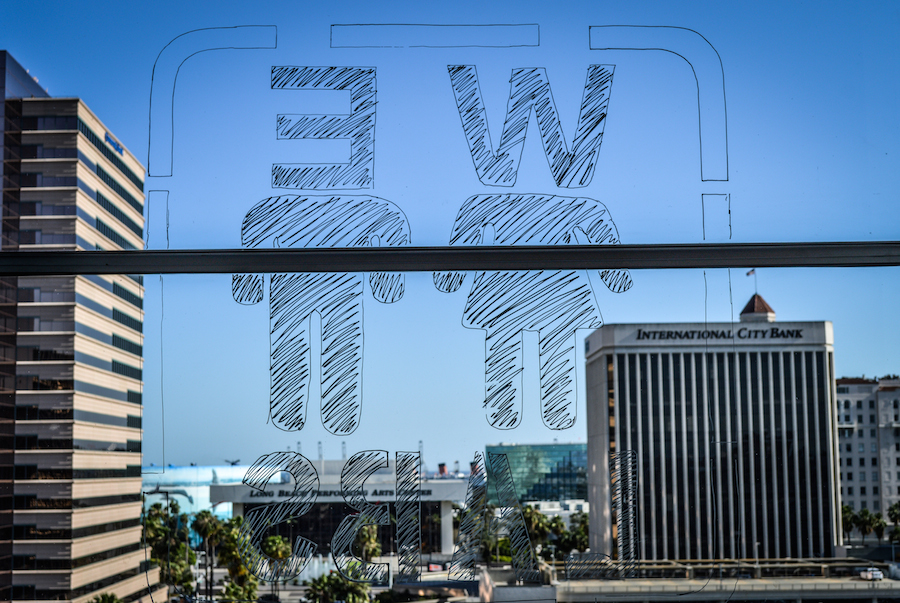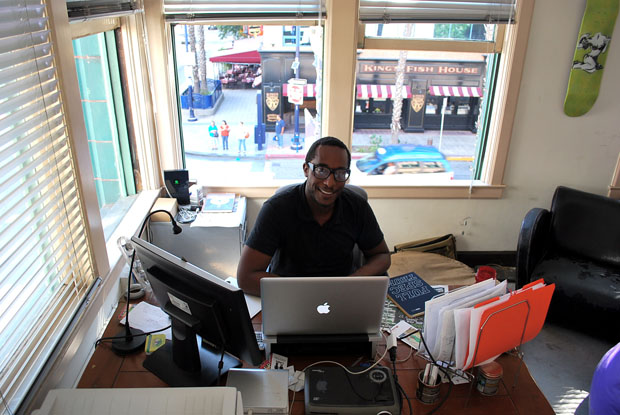
The view from one the WE Labs locations at the corner of Broadway and Long Beach Boulevard. It’s being sued for possible trademark infringement by Delaware-based WeWork. Photos by Brian Addison (above) and Sarah Bennett (below).
The case filed in United States District Court in June alleges that WE Labs’ “intentional, willful and wanton” infringement on WeWorks’ trademarks has led to damages, including lost money and property. The suit is asking for a judgement to instruct WE Labs to cease and desist from the use of the word ‘we” in its business or domain names and that all products, promotional material and stationary be turned over for destruction.
WE Labs, which was first served a cease and desist letter in February 2015, filed an answer to the suit this week with a blanket denial of the 17-page claim filed by WeWorks, asking that all charges be dismissed on the grounds that the word “we” is too common to be trademarked.
“The word “we” is an extremely common descriptive term referring ton oneself and others, that in this case refers to people coming together to work in a common location,” WE Labs’ answer states. “Although WE Labs uses it both as an acronym for the words “Work” and “Evolution” and as a signifier of collaboration.”
The two companies offer essentially the same services; shared and private office space, conference rooms, high speed internet and other general amenities for startups and entrepreneurs who lack the capital to build or maintain their own offices. Both WE Labs and WeWork operate on a monthly membership basis, where members pay for the type and size of office space their businesses require.
WeWork, a company valued in the billions—$16 billion as of March, according to the Wall Street Journal—was founded in 2009 and opened its first office in Los Angeles in 2011. It has global offices in London, Paris and Seoul and operates 80 domestic offices, including nine in Los Angeles County. Among the LA spaces are offices in Culver City, Pasadena and Santa Monica.
WE Labs was founded in 2012 and officially opened its office space in October of that year, adding a recent expansion to the Packard Building on Anaheim Street.
The WeWork complaint alleges that the simultaneous use by WE Labs of the word “we” in their business name has created confusion among prospective business people looking for workspace and that WE Labs has benefitted from the brand that WeWork has established. In its response, WE Labs denies this on the basis that the effort put forth by a person seeking an office space, like visiting it in person, would eliminate any potential confusion.
“Given the investment and commitment of both time and money that the purchase of co-working space membership requires, a business owner will most likely exercise great care and due diligence,” the response states. “This increased scrutiny in the purchasing process drastically reduces the probability of confusion among consumers.”
WeWork memberships range from about $45 per month to $450 per month for a private office and can be purchased online. We Labs has plans ranging from about $50 per month for a one year membership all the way up to its Mega Desk bundle—three dedicated workstations meant for startups—which runs about $500 per month for a one year plan, all of which initially need to be purchased in person.
 WE Labs co-founder Markus Manley tragically passed away at the age of 39 in 2014, but his co-founder and management partner, Robbie Brown, said in a release issued last month that the allegations that WE Labs was trying to use the word “we” to confuse potential clients was erroneous and that the company has been clear since its inception what the WE stands for in WE Labs.
WE Labs co-founder Markus Manley tragically passed away at the age of 39 in 2014, but his co-founder and management partner, Robbie Brown, said in a release issued last month that the allegations that WE Labs was trying to use the word “we” to confuse potential clients was erroneous and that the company has been clear since its inception what the WE stands for in WE Labs.
“There is no confusion amongst our members, potential members, nor the community here in Long Beach,” Brown said. “We would never trade on someone else’s name or attempt to benefit improperly from another company’s brand, and to suggest anything of the sort is an insult to the legacy left behind by our friend, brother, and visionary Founder Markus Manley.”
Whether or not the trademark infringement claim will stand up in court is unclear. The United States Patent Trade Office notes that trademarks that are easiest to defend are “inherently distinctive.” However, the use of the word “we,” even though both companies offer nearly identical services, could fall into the generic category, which are categorized as the “weakest” type of mark by the USPTO.
However, it does distinguish that if an entity has become associated with a certain word or phrase and associates them with a particular good or service—like community office space memberships—any other company using similar branding for a similar service could constitute trademark infringement.
WeWorks does own the rights to several trademarks, including WeWork, We Work and WeWork Labs, a mark for its incubator program that it claims to have used as early as 2011. However, it is locked in a similar battle with We Brand S.a.r.l. (WE fashion), a Dutch fashion chain, over its use of the word We.
The United States Congress has made an exception for “famous” trademarks where the owner of a trademark—which doesn’t necessarily need to be registered with the USPTO—can stop another company from using it in an attempt to avoid confusion or dilution of their brand.
A representative for WeWork was contacted by phone yesterday, but said the company was declining to comment on the ongoing legal situation between itself and WE Labs. A trial date has yet to be set, but the case could very well be headed toward mediation instead of a jury trial, as requested by WeWork.
In this case, WeWork could arguably be considered famous given its stock valuation and global reach. If a court finds that WE Labs’ use of the word “we” in its name has damaged WeWork and awards it the damages it’s seeking—attorney fees, statutory damages, rebranding of WE Labs—it could irreparably damage WE Labs, potentially putting them out of business, something its legal counsel contends has been the aim all along.
“In our opinion it has been clear from the start the suit is an attempt to cripple us while they take over Long Beach,” said Ted Sieving, a lawyer representing WE Labs.
A suggestion in its press release issued last month hinted at WeWork’s desire to move into the Long Beach market, something that was confirmed during last night’s Downtown Long Beach Associates (DLBA) board meeting. A source present at the meeting, who wished to remain anonymous, confirmed that Vice President Tolliver Morris announced that WeWork was indeed opening up shop in Long Beach, a few floors above the DLBA and one block west of a WE Labs office.

